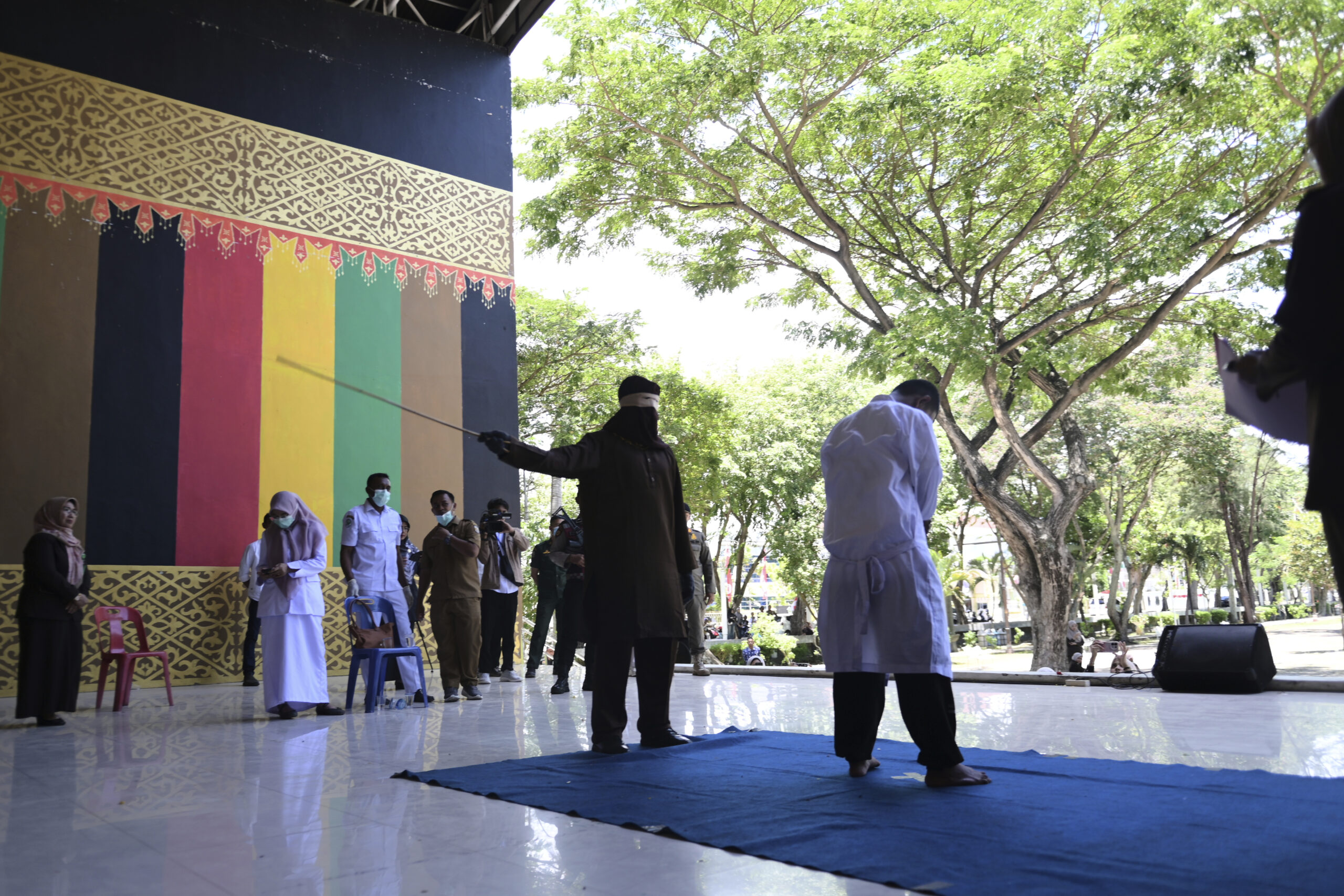
BANDA ACEH, Indonesia (AP) — Two men in Indonesia’s conservative Aceh province were among a group of people publicly caned on Tuesday after an Islamic Shariah court convicted them of violating Islamic law by hugging and kissing, which the court ruled can lead to banned sexual relations.
An audience of about 100 people witnessed the caning on a stage in Bustanussalatin city park in Banda Aceh on Tuesday. The men, aged 20 and 21, were whipped across their backs with a rattan cane dozens of times by a group of people wearing robes and hoods.
Aceh allows up to 100 lashes for morality offenses including gay sex and sex between unmarried people. Caning is also a punishment in Aceh for gambling, drinking alcohol, women who wear tight clothes and men who do not attend Friday prayers.
The court in Aceh sentenced the men to 80 strikes each after Islamic religious police said they caught them engaged in what the court deemed were the sexual acts of hugging and kissing in a bathroom of a public park, court records said.
Eight other people were publicly caned Tuesday for adultery and gambling.
The men were arrested in April at Taman Sari city park in Banda Aceh after residents told a police patrol they saw the men enter the same park bathroom. The police found the men inside kissing and hugging. Prior to meeting in the park, the pair made contact through an online dating app, court records said.
Aceh is the only province in Indonesia to practice Shariah law. There have been four previous canings for cases related to homosexuality since the province implemented Islamic law and established a religious police and court system in 2006. The change was a concession by the national government to end a long-running separatist uprising.
Indonesia’s national criminal code does not regulate homosexuality but the central government cannot strike down Shariah law in Aceh. However, the central government previously pressured Aceh officials to drop an earlier version of a law calling for people to be stoned to death for adultery.
Aceh expanded its Islamic bylaws and criminal code in 2015, extending Shariah law to non-Muslims, who account for about 1% of the province’s population.
Two other men were publicly caned in February at the same Aceh park after a Shariah court convicted them of having sex.
A coalition of human rights groups filed a petition to Indonesia’s Supreme Court in 2016 seeking a review of Aceh’s regional regulations allowing caning, but the request was rejected. Indonesia’s Ministry of Home Affairs issued a letter in 2016 to Aceh’s governor about caning, noting regional laws in Indonesia should be enforced for minor crimes.
Canning is a corporal punishment and Indonesia has ratified a convention mandating the abolition of inhumane punishments, said Maidina Rahmawati, acting executive director of the Institute for Criminal Justice Reform in Indonesia.
“That public caning, even the act of caning itself, is contrary to various laws and regulations and also contrary to human rights interests in Indonesia because its exposure is not good for Indonesia,” Rahmawati said.
Shifting political dynamics played a role in the implementation of the policy, Rahmawati said.
“Because it seemed like this was the right thing to do, it had to be done, it had to be narrated to support the Sharia-based government in Aceh,” Rahmawati said.
Amnesty International issued a statement Tuesday calling the caning of the two men “a disturbing act of state-sanctioned discrimination and cruelty.”
“This punishment is a horrifying reminder of the institutionalized stigma and abuse faced by LGBTQ+ individuals in Aceh. Intimate relationships between consenting adults should never be criminalized,” Amnesty’s Regional Research Director Montse Ferrer said in the statement.
Aulia Saputra, a Banda Aceh resident who attended the caning, said the punishment may prevent other violations of Shariah law.
“I hope that with the implementation of this caning punishment, it can serve as a lesson for the offender and also create a deterrent effect, so that such incidents do not happen again in the future,” Saputra said.
___
Tarigan reported from Jakarta, Indonesia.
